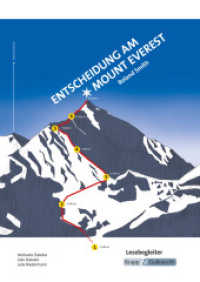基本説明
New in paperback. Hardcover was published in 2007. Contains detailed first-person accounts of offenders' family members and their experiences in the criminal justice system; Applies restorative justice princples to capital crimes, invovling families and communities in the healing process. Selected by Choice as an outstanding academic title of 2007.
Full Description
The press called Martin's actions a "crime spree." Terrified that his son would be sentenced to die, Martin's father Phillip committed suicide; ironically, the jury, moved by this desperate act, spared Martin's life. Phillip's story, like those of the other parents, siblings, children, and cousins chronicled here, vividly illustrates the precarious position occupied by capital offenders' families. Living in the shadow of death, they are crushed by trauma, grief, and helplessness. In this penetrating account of guilt and innocence, shame and triumph, devastating loss and ultimate redemption, their voices add a new dimension to the debate about capital punishment.
These narratives are woven together by restorative justice theory, which holds offenders accountable while searching for ways to mend the communities and lives torn apart by their crimes and integrating offenders' families into the process of promoting justice and healing. What emerges from myriad in-depth interviews with offenders' and victims' families, legal teams, and leaders in the abolition and restorative justice movements is a vision of justice rooted in the social fabric of communities, showing that forgiveness and recovery are possible even after terrible crimes. While holding victims' stories sacred, this eye-opening book bridges the pain of living in the shadow of death with the possibility of a reparative form of justice. Anyone working with victims, offenders, and their families - from lawyers and social workers to mediators and activists - will find it indispensable to their efforts.
Contents
FOREWORD BY STEVE EARLE; INTRODUCTION; PART ONE: THE SHADOW OF DEATH; PART TWO: STORYTELLING; PART THREE: RESTORATIVE JUSTICE; CHAPTER 11: SYSTEMS FAILURE; AFTERWORD







